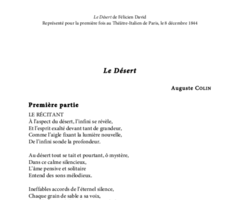Le Désert
Composed in 1843, Le Désert was premiered at the Théâtre-Italien on 8 December 1844 with Théophile Tilmant conducting. Described as an “ode-symphonie” (a new genre created by David) for tenor solo, narrator, chorus and orchestra, the work, based on an alternation of instrumental pieces, arias, choruses and recitations, comes halfway between a symphony and an oratorio. The work is part of the orientalist trend that was stimulated by artists’ travels, as well as by the dissemination of narratives and art works inspired by a more or less fantastical “elsewhere”. In a succession of musical tableaux, Le Désert presents lyrical descriptions of desert scenes, as a caravan moves through the Sahara. In 1831 David had joined the Saint-Simonian community in Ménilmontant, becoming its official composer. Two years later, with a group of fellow evangelists, he had travelled to Egypt and the Middle East preaching the doctrine of Père Enfantin (Barthélemy Prosper Enfantin), the self-designated Supreme Father of the Saint-Simonians, and during those travels he had transcribed several Arab melodies that he had heard. His symphonic ode contains many references to such “oriental” music (as it was termed), which had so impressed him. From the imaginary prayer of the muezzin, written to a semi-invented text, to the most authentic “Rêverie du soir” at the end of the second part of the work (it is based on a melody that he heard sung by boatmen on the Nile, and which is to be found elsewhere, for example in Villoteau’s Description de l’Égypte, published after the Napoleonic expedition of 1797), we explore all kinds of “musical orientalism”. Le Désert, which was performed to great acclaim, maintained its popularity throughout the nineteenth century.
Focuses
Focus

